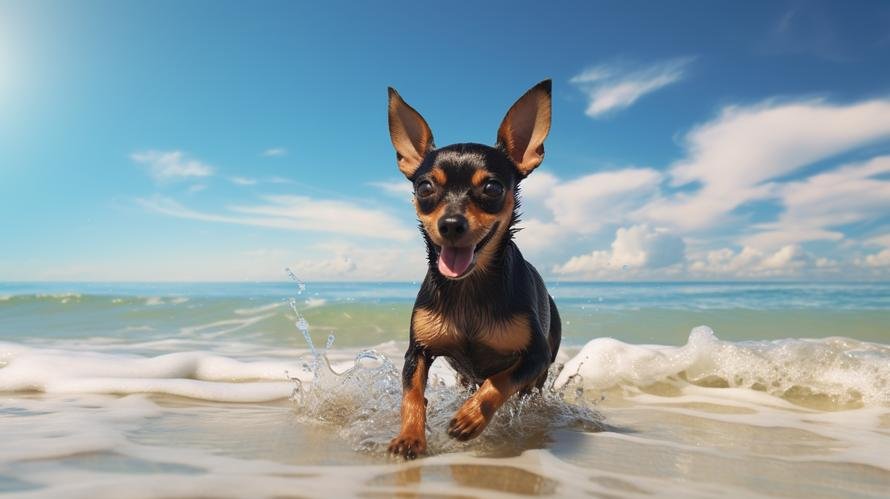Whether you’re a proud owner or considering adding a Miniature Pinscher to your family, you’re likely curious about their dietary needs. Therefore, you might be asking, “Does a Miniature Pinscher need special dog food?” Well, the answer is a bit more involved than a simple yes or no. We’re going to delve deep into their dietary needs for better comprehension of this energetic and lively breed.
Let’s start with some unexpected breaking news: Miniature Pinschers are not actually tiny Doberman Pinschers. Though they may look like pint-sized versions of the muscular guard dogs, they’re an entirely different breed. In fact, this fascinating breed is believed to date back a few hundred years before the Doberman!
Now, let’s get to the main question: “Does my Miniature Pinscher have unique dietary needs?”
Just like humans, dogs’ dietary necessities vary based on their size, activity level, age, and overall health. The same goes for Miniature Pinschers. For starters, they’re classified as a small breed. But don’t let their compact size fool you; they do pack a punch when it comes to energy level, requiring potent and balanced nutrition.
A Miniature Pinscher’s diet should ideally be high in protein to support muscle mass, countered by necessary quantities of fiber, healthy fats, vitamins, and minerals. These nutrients can often be procured in general dog food brands. However, selecting specific food tailored towards small, active breeds such as this one can potentially provide them with superior nutrition.
You might be wondering why you can’t just feed your Miniature Pinscher with the same food you’d serve to larger breeds. Well, there’s some convincing logic behind that. Smaller dogs like Min Pins have higher metabolic rates than larger dogs. In other words, they burn energy (calories) quicker than their more giant counterparts. Therefore, they essentially need more calories per pound of body weight to keep their energy levels up.
They could technically acquire these extra calories by simply eating larger amounts of regular dog food. But didn’t anyone mention they have notably tiny stomachs? Their small stomachs require smaller kibbles for easier digestion, making it impractical for them to consume large food quantities. For this reason, quality over quantity is the name of the game when it comes to feeding your Min Pin.
Formulas specially designed for small, active breeds often incorporate higher concentrations of necessary nutrients and come in smaller, bite-sized pieces. These are perfect for satisfying the nutritional requirements of your Miniature Pinscher without burdening their small bellies.
But can’t I just feed them the food I eat, you might think. Once again, the answer isn’t a plain yes or no. While they can technically eat some human foods safely, this shouldn’t make up the majority of their meals. Dogs, in general, have different dietary needs than humans and can be sensitive to certain human foods.
For example, feeding your Miniature Pinscher leftover bones from dinner can present serious choking hazards or internal injuries due to splintering. Several common human foods can be outright toxic to canines like chocolates, onions, grapes, or xylitol, an artificial sweetener often found in candies and chewing gums.
A well-balanced diet for your Miniature Pinscher typically includes a mix of meats, vegetables, and grains, meticulously blended to ensure your pet receives all the necessary vitamins and minerals. For puppies, getting a nutrient-rich diet is pivotal for growth and development.
Suppose you have an elderly Min Pin or one with specific health conditions. In that case, they might require special diets that cater to their unique needs – regular food may not reach these nutritional demands. In such instances, it’s best to consult with your vet for specific dietary advice.
In conclusion, do Miniature Pinschers need special dog food? Ultimately, they need a food that suits their size, satisfies their energetic nature, and nourishes their overall well-being. So while they don’t necessarily need “special” food, they indeed require thoughtful dietary consideration.
Invest in a high-quality, nutrient-dense food designed for smaller, energetic breeds. This way, you’re not just feeding them, you’re nourishing them to live their lives to the fullest, bounding around your home like the lively, lovable pups they are.
At the end of the day, ensuring your Miniature Pinscher is getting the best possible diet can lead to a healthier, happier, and longer life for your pint-sized pal. And isn’t that what we all want for our furry friends?



